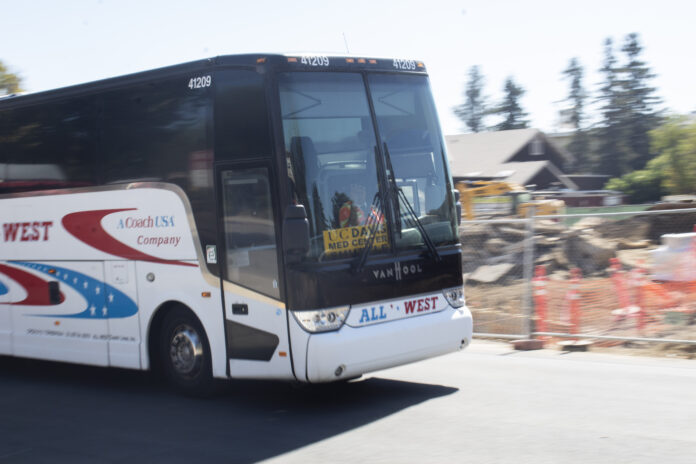Free fare for six months for UCD affiliates, with bicycle storage, direct intercampus stops
The launch of the Yolobus and SacRT Causeway Connection public bus service, which was set to replace the long-running UC Davis intercampus shuttle service on April 6, has been postponed through May 1 due to COVID-19-related matters.
The decision of the service replacement previously resulted in riders’ concerns. Following the replacement’s announcement, many intercampus shuttle riders expressed their concerns and requests in an open letter published in October of 2019.
The letter outlined complaints about the zero-emission service, which had no seat belts, dramatically reduced the capacity for bikes, increased commute times as a result of added public stops and terminated direct intercampus connectivity. There were also complaints regarding a lack of communication between the UC Davis administration and shuttle riders in the decision-making process.
Since then, administrators have offered open house meetings on both the UC Davis and Sacramento campuses, as well as online comment opportunities and regular outreach to communicate with riders.
Russ Zochowski, a disability specialist at the university’s Student Disability Center, stated in a previous article in The California Aggie that he relied heavily on the shuttle and its current stops as someone who is blind.
In a recent interview, Zochowski said he was unable to attend the open house meetings, but addressed his personal access concerns as a result of the changed bus stops directly with UC Davis’ Transportation and Parking Services and the supervisor of the UC Davis Health drivers.
“The driver supervisor has assured me that I will still be able to get rides from [UC Davis Medical Center] to my outpatient clinic appointments and to the 39th Street light rail station,” Zochowski said. “I found the 29th Street station inaccessible because of the need to cross two streets without audible walk signals.”
Zochowski also commented on the accommodations made for other frequent shuttle riders.
“After reading the meeting summaries, I agree with the majority of riders who feel that we probably got all we could from the University at this point,” Zochowski said. “They promised to retrofit the existing buses with seat belts and increase the number of bike racks. Let’s see if those things actually happen.”
Vice Chancellor of Finance, Operations and Administration Kelly Ratliff released a message on March 31 stating that the Causeway Connection was “improved markedly with ridership involvement.”
UC Davis Director of Environmental Planning and Local Government Relations Manager Matt Dulcich said rider feedback received through outreach efforts and public meetings has been critical in improvements to the service.
“The University is paying for fares for all Aggie riders through October with use of their University ID,” Dulcich said. “UC Davis will offer complimentary bicycle cage storage such as the new facility at the Gateway Parking Structure for any rider wishing to have a dedicated, secure bicycle parking stall on campus. The Causeway Connection will provide expanded service during peak hours and maintain direct trips between campuses allowing for more flexibility in commute schedules.”
Dulcich explained the addition of “Smart Stops,” where different transportation system routes intersect near or along main thoroughfares and freeways.
“Stops in the Downtown Sacramento area would allow students to reach internships, riders to connect with other bus lines and modes of transportation, and have easy access to shopping and entertainment,” Dulcich said.
To accommodate riders who relied on the original intercampus routes, Dulcich said there will be direct and express trips for commuters wishing to travel directly between the campuses. Additionally, Dulcich said there will be no difference in the pricing structure for employees and graduate students at the end of the six-month fare free period.
“While switching from diesel to electric buses and helping to reduce congestion and emissions along I-80, we also had to consider where we could make improvements for the everyday Aggie rider and their door-to-door commute,” Dulcich said.
Dulcich noted that the administration will continue to solicit rider feedback at quarterly meetings beginning in May 2020 and conduct detailed monitoring of bus utilization, on-time performance and rider satisfaction to continue to improve the service in the future.
The Causeway Connection is currently set to launch in May after careful consideration with Yolobus and SacRT of all options for maintaining public health protection and providing needed transit services. Dulcich said they expect to continually adjust the bus services as the COVID-19 situation progresses.
Written by: Graschelle Fariñas Hipolito — campus@theaggie.org




